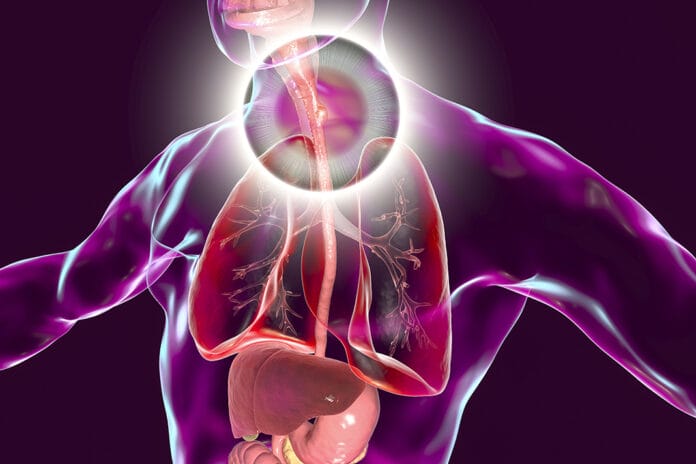Scientists have long hypothesized that periodontal disease may increase someone’s chances of developing cancer in the future. The topic was explored in an article titled, “Periodontal disease, tooth loss, and risk of esophageal and gastric adenocarcinoma: a prospective study.” The piece was published in Gut, a monthly peer-reviewed medical journal on gastroenterology and hepatology by the British Medical Journal.
About Esophageal Cancer
The esophagus is a hollow tube that carries food down through the throat and into the stomach. According to the nonprofit organization National Cancer UK, esophageal cancer occurs when cancer cells collect and grow inside the organ. It is the sixth leading cause of cancer-related deaths around the world, especially among men and older adults. People who suffer from obesity, poor nutrition, or consume a substantial amount of tobacco and alcohol are more likely to be diagnosed with esophageal cancer.
Patients with esophageal cancer usually report having a hoarse voice, severe heartburn, or chest pain that won’t subside. Weight loss, indigestion, and feeling pain or a burning sensation when trying to swallow food and beverages can also occur. Additional symptoms include a lingering cough, coughing up blood, and difficulty keeping food down.
About Gastric Adenocarcinoma
Gastric Adenocarcinoma or stomach cancer occurs when cancerous cells gather inside the mucosa or innermost lining of the stomach. This type of cancer may develop due to a severe case of gastroesophageal reflux disease, stomach polyps, or the accumulation of a microaerophilic, spiral bacteria called Helicobacter pylori.
Patients with Gastric Adenocarcinoma usually experience heartburn, indigestion, nausea, vomiting, and stomach pain. Other signs include difficulty swallowing, along with feeling bloated and full after eating only a small amount of food. Stomach cancer usually affects people over the age of 65.
About the Study
The researchers decided to study patients with a history of periodontal disease to see if there was a correlation between oral microbiota and the future development of esophageal and gastric cancer. The investigators included Chun-Han Lo from the Department of Epidemiology at the Harvard T.H. Chan School of Public Health and Sohee Kwon from the Division of Gastroenterology, Massachusetts General Hospital, and Harvard Medical School. They also enlisted the help of ten other colleagues to complete the study.
The team closely reviewed the medical records and validated follow-up questionnaires from two previously conducted studies. The Health Professionals Follow-up Study lasted from 1988 to 2016 and included 49,685 men, while the Nurses’ Health Study spanned from 1992 to 2014 and tracked the health of 98,459 women. The patient’s lifestyle habits, diet, demographics, and dental measures were also assessed.
The Health Professionals Follow-up Study lasted from 1988 to 2016 and included 49,685 men, while the Nurses’ Health Study spanned from 1992 to 2014 and tracked the health of 98,459 women. The patient’s lifestyle habits, diet, demographics, and dental measures were also assessed. Chun-Han Lo and the team used Cox proportional hazards models to calculate the hazard ratios and completed a joint analysis that included tooth loss as well as their medical history of periodontal disease.
The results showed that patients with periodontal disease and tooth loss were associated with a 43% and 52% increased risk of esophageal cancer and gastric adenocarcinoma cancer. This was based on 199 cases of esophageal cancer and 238 cases of gastric adenocarcinoma over a period of two decades. Patients who did not experience tooth loss still were at a 42% and 33% higher chance of getting diagnosed with those types of cancer. Overall, patients were more likely to be diagnosed with gastric cancer and esophageal cancer if they had previously lost teeth due to periodontal disease. The authors believe future studies should further examine the possible cause and effect of oral microbiomes on the development of esophageal and gastric cancer.
Before you leave, check out the Today’s RDH self-study CE courses. All courses are peer-reviewed and non-sponsored to focus solely on high-quality education. Click here now.
Listen to the Today’s RDH Dental Hygiene Podcast Below:
Website Sources
https://gut.bmj.com/content/early/2020/06/30/gutjnl-2020-321949
https://www.cancerresearchuk.org/about-cancer/oesophageal-cancer
https://www.cancer.org/cancer/stomach-cancer/about/what-is-stomach-cancer.html











